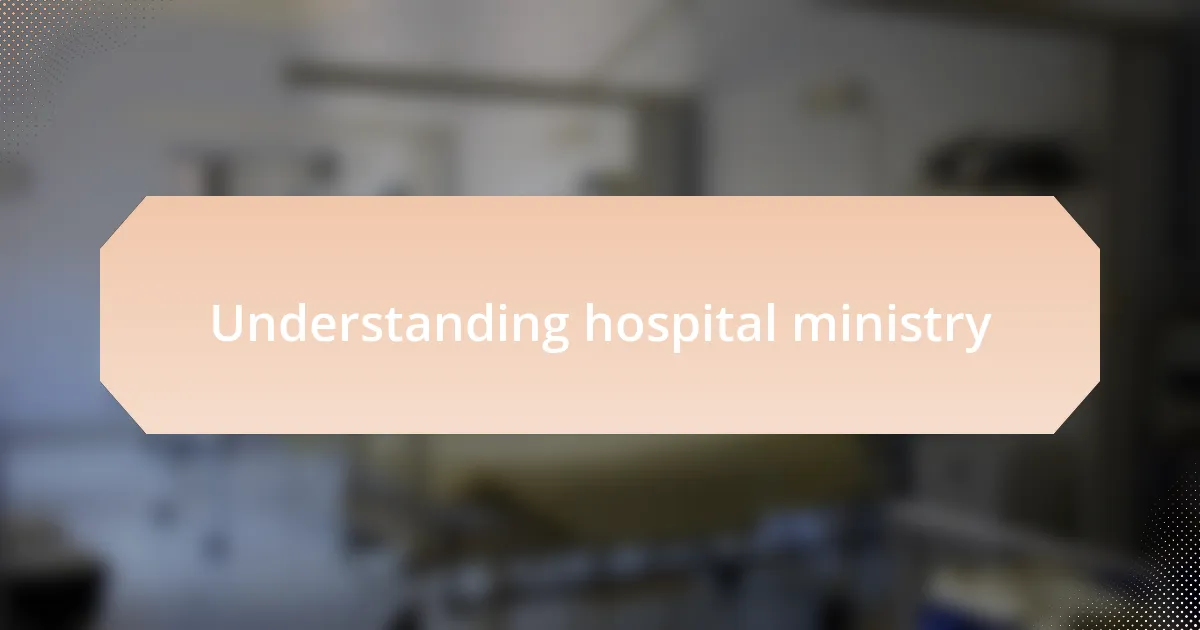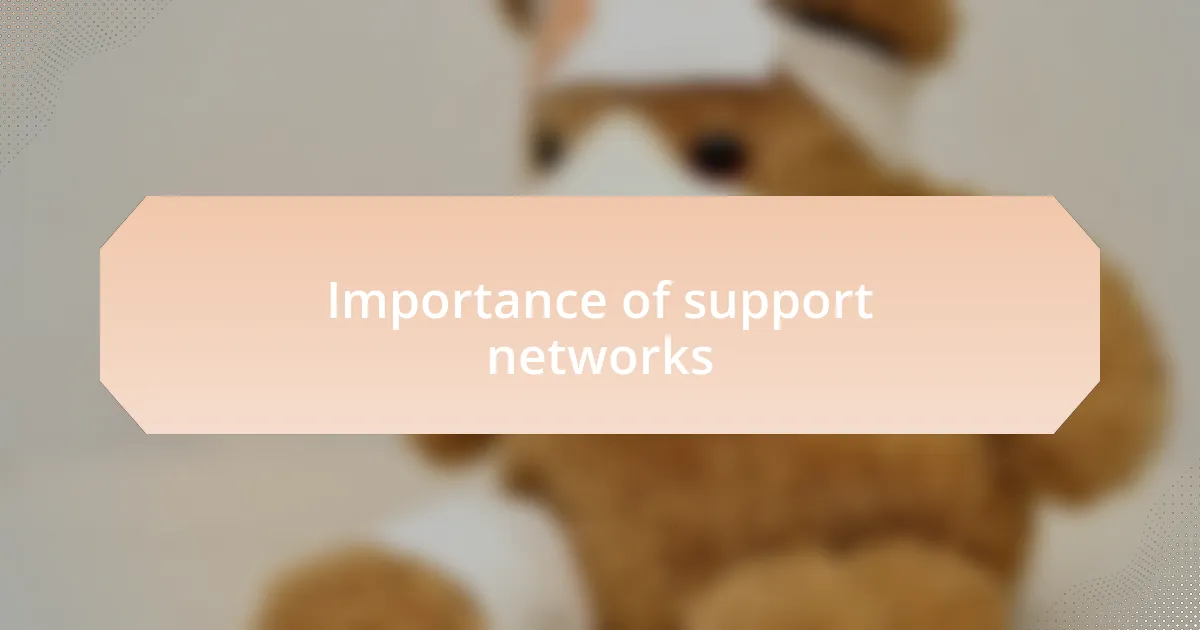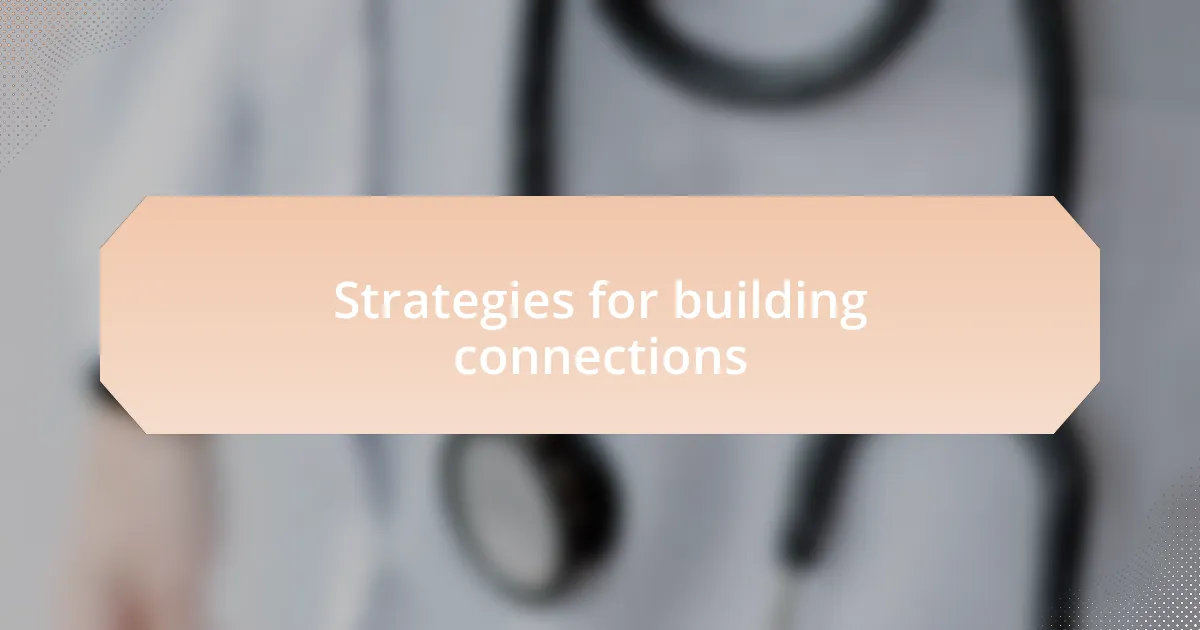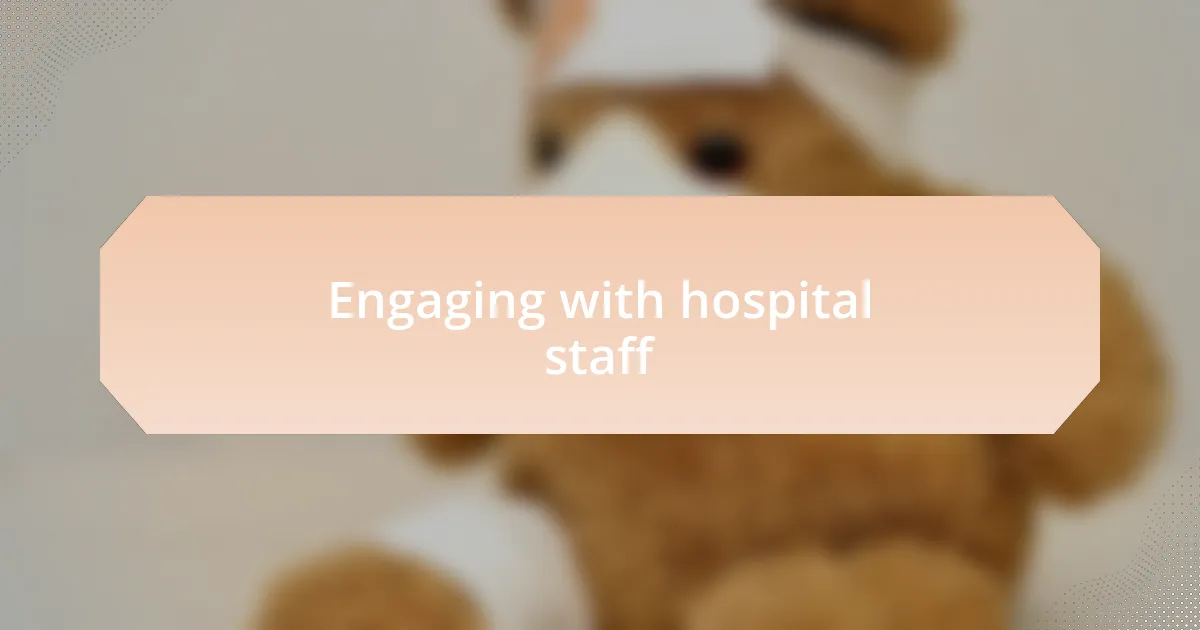Key takeaways:
- Hospital ministry goes beyond offering prayers; active listening and small gestures of kindness can significantly uplift patients’ spirits.
- Support networks enhance emotional resilience and collaborative care, fostering deeper connections among caregivers.
- Engaging effectively with hospital staff involves genuine interest, shared insights, and consistent communication to build trust and collaboration.
- Sharing personal experiences and insights can strengthen relationships and promote collective wisdom within the ministry.

Understanding hospital ministry
Hospital ministry is a vital form of pastoral care that extends beyond the walls of a church, reaching out to those facing physical and emotional challenges. I remember my first visit to a hospital room; the silence was palpable, filled not just with the beeping of machines but with the weight of anxiety and fear. In that moment, I realized that my role was not just to offer prayers but to actively listen and provide comfort.
Engaging with patients often requires sensitivity and an understanding of their unique situations. When I first began, I struggled with the right words to say, but I learned that sometimes, just holding a hand or sharing a personal story of hope can make all the difference. Have you ever found that a simple act of kindness has the power to uplift someone’s spirit? It’s in those small interactions that the presence of healing becomes tangible.
The emotional bonds formed in these brief encounters can be life-altering, not only for the patients but also for the caregivers. Reflecting on the many heartfelt conversations I’ve had, I’ve seen how a single moment can spark a sense of peace in a troubled heart. Isn’t it fascinating how the act of simply being there can foster hope and resilience during such challenging times? Understanding hospital ministry is about recognizing that we are called to be beacons of light in the darkest hours.

Importance of support networks
Support networks are crucial in hospital ministry because they provide strength and encouragement when individuals face their most challenging moments. I vividly recall a time when a fellow clergy member reached out to me during a particularly tough week. That simple gesture of support reminded me that I am not alone in this ministry; it reinforced the idea that sharing burdens can lighten the load for everyone involved. Have you ever felt empowered by someone else’s presence?
The impact of having a support network cannot be overstated. It not only enhances our ability to serve but also enriches our emotional resilience. I once attended a small gathering of hospital chaplains, and it was transformative. Listening to one another’s experiences and sharing struggles allowed us to cultivate a deep sense of community, reminding me that vulnerability is a strength in this line of work. Isn’t it remarkable how collective experiences can foster healing?
In my journey, I’ve discovered that support networks lead to healthier practices for caregivers. When I began nurturing these connections, I realized that it was okay to share my feelings and concerns freely. This exchange of support has given me new perspectives and innovative ideas on pastoral care, proving that collaboration not only benefits us but also enhances the quality of care we provide to our patients. How often do we overlook the power of these connections? It’s vital to recognize that we all thrive when we engage in these meaningful relationships.

Identifying key stakeholders
Identifying key stakeholders is foundational in building a robust support network. For me, the process began by reflecting on the relationships that mattered most in my ministry. I realized that my colleagues, mentors, and even hospital staff play critical roles, each bringing unique insights and resources to the table. Have you considered who truly supports your mission?
As I looked closer, I found that engaging with family members of patients was equally vital. They often have profound insights into the emotional needs of those in the hospital. I recall a touching moment when a patient’s family shared their struggles with me; their perspectives deepened my understanding of compassion in care. This realization transformed my approach to engagement, making me appreciate that stakeholders aren’t just professionals—they’re also voices that need to be heard.
Furthermore, community organizations can serve as tremendous allies in the hospital ministry landscape. I once partnered with a local non-profit focused on mental health, and the collaboration was eye-opening. Their resources complemented our efforts, leading to innovative programs that benefited both patients and staff. Isn’t it fascinating how broadening our circle can unlock new avenues of support? Finding and valuing these key stakeholders can significantly enhance our impact and enrich our ministry.

Strategies for building connections
Building connections often starts with simple conversations. I remember attending a community health fair where I took the opportunity to chat with attendees about their experiences in healthcare. Each conversation revealed shared concerns and interests, laying a groundwork for future collaborations. Have you ever thought about how a casual chat might unlock unexpected opportunities in your own ministry?
As I continued to foster these relationships, I realized that hosting regular gatherings could strengthen our network. I initiated monthly meetups with local volunteers and hospital staff to discuss ongoing projects and share successes. During one particularly memorable gathering, a volunteer shared how their personal experience with grief shaped their approach to hospital ministry. These moments of vulnerability not only solidified our bonds but also ignited innovative ideas for patient support. How might regular check-ins enhance your connections?
Another impactful strategy was leveraging technology to stay connected. I set up a private online group where stakeholders could share resources, experiences, and emotional support. This virtual space became a refuge for many, where they felt safe to express their fears and triumphs. I vividly recall one evening when a member posted about a challenging day; within hours, others chimed in with encouragement and advice. How do you use technology to bridge gaps in your own support network?

Engaging with hospital staff
Engaging with hospital staff involves more than just pleasantries; it requires a genuine interest in their personal and professional lives. I once made it a point to learn about the nurses’ shifts and routines. By greeting them as they arrived and validating their efforts during busy hours, I found that small gestures of recognition truly fostered trust and camaraderie. Have you noticed how a simple “thank you” can brighten someone’s day?
Collaboration is vital in hospital settings, and I discovered that sharing insight about our ministry with staff can create a shared purpose. I recall a chance meeting with a hospital chaplain, where I explained how our team could support their efforts during critical moments. Our conversation sparked ideas on how we could work together on patient care, ultimately enhancing the experience for everyone involved. How often do you look for ways to collaborate with those around you?
Moreover, I learned that participation in hospital meetings or committees can break down barriers. By showcasing our ministry’s goals and vision, I often found common ground with physicians and administrators. During one meeting, I presented a proposal that proposed integrating holistic care methods into their existing framework, and the positive reception was exhilarating. Have you ever considered how sharing your vision could lead to remarkable collaborations?

Maintaining long-term relationships
Building and maintaining long-term relationships requires consistent communication and personal investment. I remember a time when I scheduled regular check-ins with the staff I had connected with. These casual conversations, where I asked about their lives outside of work, not only strengthened our bond but also revealed insights that made our collaborative efforts more effective. Have you ever noticed how deepening your understanding of someone’s world can lead to unexpected opportunities for support?
Trust is not built overnight; it requires patience and authenticity. Early on, I made it a priority to follow up on promises, however small, as these actions demonstrated my reliability. I’ll never forget one instance when I committed to providing resources for a staff member’s upcoming seminar. Following through with that promise not only helped them feel valued but also solidified our partnership over time. How often do you reflect on your commitments to others?
Additionally, celebrating milestones together can greatly enhance the sense of solidarity within your network. I organized a small appreciation dinner once for the staff after a particularly challenging month. Seeing their faces light up and hearing their laughter as they shared stories was a reminder of how far we had come together. Don’t you think that creating shared memories can strengthen those long-lasting connections?

Sharing personal experiences and insights
Sharing personal experiences and insights in the realm of hospital ministry has been transformative for me. I recall a moment when I opened up about a particularly tough encounter with a patient to a fellow staff member. Instead of just sharing the burden, I discovered that they had faced something similar, leading to an enriching conversation that brought us closer. How powerful is it to know that you’re not alone in your experiences?
I also remember organizing a workshop where team members could share their personal stories regarding patient care and support. The vulnerability displayed was incredible—it sparked deeper conversations about not just our work but our lives. It was in these moments that I realized how much we could learn from each other’s journeys. Have you ever considered how your story could resonate with someone else’s, fostering a sense of community?
Moreover, sharing insights can be a catalyst for growth. There was a time when I shared a lesson learned from a difficult family interaction at a staff meeting. Not only did it help others navigate similar situations in the future, but it also encouraged them to open up about their own experiences. This collective wisdom turned our team dynamics into something much more supportive. Wouldn’t you agree that creating a space for shared learning is crucial in developing a strong support network?